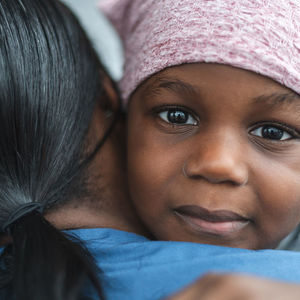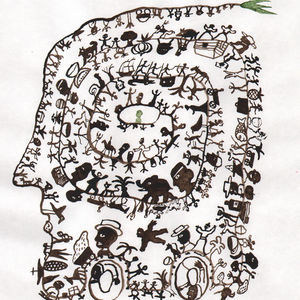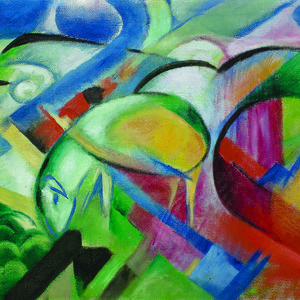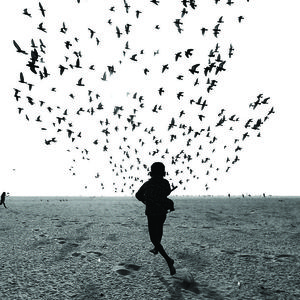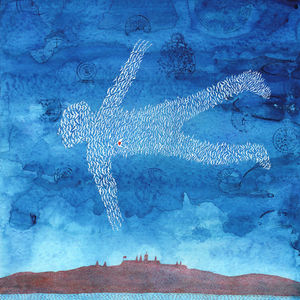- Doing Good
- Goodness Gracious
- Pain Relievers
- Call It Human Nature
- Storylines
- The Sickness Swing
- The Sound of Sublime
- Moving Pictures
- Body Language
- A Quiet Incarnation
- Giving Upward
- Dauntless Luminescence
- The Shining Joy of Falling Flat on Your Face
Goodness is not the good student, though it may be the good child and even more the good parent.
There is goodness in a good laugh and in the acts or words that prompt it, as long as they are free of meanness.
There is no meanness in goodness, but there is strength. In fact, goodness may be the strongest element in the world.
There is goodness in a nod to a stranger and in the nod the stranger returns, especially if that stranger is different in some significant way. The greater the difference, the greater the goodness.
Goodness is showing hospitality to strangers without the promise of entertaining angels. It is feeding the hungry, giving drink to the thirsty, clothing the naked, caring for the sick and visiting the prisoner without the promise that Jesus — or anyone else — will remember you for it.
Goodness is protecting the fatherless, the motherless, the partner-less, and the never-partnered without expecting heaven for it.
Goodness keeps company with love, joy, peace, patience, kindness, faithfulness, gentleness and self-control. Even if there were a law against it, it would transcend the law.
Hinduism has a saying: nishkam karma — acting selflessly without attachment to the fruit of the action. This is goodness.
There is goodness in not getting your own way and being thankful someone else did, especially if the two outcomes are related. There is goodness in encouraging someone in an endeavor and offering praise if it’s successful or comfort if it’s not, especially if that endeavor was in competition with your own.
There is goodness in anonymity in giving and goodness in taking public responsibility, especially for things that have gone wrong. There is goodness in giving with the right hand without letting the left hand know what you’re doing. And there is goodness in refusing to believe that the things you have accumulated, in whatever way, even through hard work, are yours alone.
There is goodness in the idle return of a child’s runaway ball and in the smile the child gives when the ball is returned. There is goodness in a child’s play and in taking the time to watch it.
There is goodness in remembering when remembering brightens someone’s eyes, including your own. And there is goodness in forgetting when no one benefits from your remembering except maybe you.
Goodness is giving someone the outcome they want when you don’t want it but it won’t hurt anything other than your own ego or pride. Goodness is turning the other cheek, but it’s also standing firm for the things and people you believe in.
Goodness is asking rather than telling, though there is goodness in telling others about your life when it’s your turn to talk.
There is goodness in telling stories that delight, and goodness in telling stories that sadden — even horrify — if they awaken awareness of what is good. There is goodness in listening to stories, too — all kinds of stories about all kinds of things and people.
There is goodness in study and goodness in knowledge that opens one’s eyes and mind and heart without engendering pride or contempt or oppression.
There is goodness in letting children speak. Goodness in helping children learn. Goodness in children.
There is goodness in a sound body: goodness in using it, goodness in nurturing it, goodness in strengthening it. But there is goodness in a body’s failings, too, in youth and in age. Bodies are teachers of goodness.
Goodness is seeking understanding and letting that understanding begin with the words of the least powerful among us.
Goodness is trusting. More than that, it’s fostering trust. It’s smiling at the scared child. Calling to the scared cat. Speaking softly, without anger, to the man or the woman threatening to call the police because you aren’t where they think you should be. But it’s staying where you are, too, when you have a right to be there, to ensure a safe place for others who might want or need to be there.
Goodness is letting go when the time for letting go comes. Goodness is giving another a turn. Even your turn. Even if it’s your only one.
Goodness is justice that doesn’t exult in being just but quietly rights the wrongs done to a person or a people.
Having a job is goodness. Doing it well is goodness. Doing it even when you see no benefit in doing it can be goodness. Although leaving it when its purpose is lost can be goodness, too.
There is goodness in work. Goodness in hard work. Goodness in meaningful work. But there is goodness in rest as well. Goodness in play. Goodness in letting go of your work for a while, even when your work is a kind of goodness, for goodness can lose its goodness when pursued too single-mindedly.
There is goodness in being present. Goodness in staying open. Goodness in living every moment with everything you have. But there is goodness in planning for the future, too. Goodness in remembering the lessons of the past. Goodness in doing nothing but being still.
There is goodness in patience. In slowing down. In looking around. There is goodness in looking at people rather than rushing by, especially if you have no reason to look at them, or even a reason to look away. Seeing and being seen are both goodness.
There is goodness in nature, goodness in seeing humans as part of nature, goodness in letting the wild be wild, even in ourselves.
There is goodness in animals, tame or feral. Goodness in mammals, reptiles and birds. Goodness in insects, bats and snakes. Goodness in spiders and worms.
Music is often filled with goodness. Silence is, too.
There is goodness in helping the earth survive. Goodness in letting it heal. Goodness in keeping our footsteps light.
There is goodness in air, goodness in breathing, goodness in breathing pure air.
Living simply is goodness. Taking care not to use more than you need is goodness. Seeking quiet is goodness. Especially if done for the earth and for others.
God is good, and goodness flows from God. But goodness is different from God. Different from godliness.
Goodness isn’t living a faultless life. It’s quickly acknowledging faults in yourself while rarely seeing — or mentioning — faults in others. Goodness is being humble and kind, but goodness is being confident, too, when the time for confidence comes — the time for words or actions.
There is goodness in feasting and goodness in fasting, each in its own day. There is goodness in the taste of good fish or good steak or good cake or good wine, and goodness in choosing to forgo these tastes, for a season or a lifetime.
Freedom is goodness, but goodness decays when freedom becomes an end in itself, an excuse to avoid the requirements of conscience or community.
Goodness is walking a mile with another when the walk is difficult, then going another mile as well, without the other one asking. Goodness is sharing your clothing with one who is cold, when you’ll be cold yourself if you do. Goodness is giving another your food when you’ll go hungry. It’s giving another a chance before you’ve had your own.
Goodness is overflowing from most of the overlooked words and actions of Jesus.
Goodness is not being right, and certainly not insisting you’re right. It’s more concerned with rights than rightness. Or even righteousness. Goodness seeks to defend the vulnerable instead of asserting privilege or power.
Goodness is losing yourself in joy without losing your understanding when others are not as joyful as you are. Goodness is feeling loss — and feeling it fully — without requiring that others lose something, too.
There is goodness in grace extended instead of scorn, mercy given instead of punishment, forgiveness that wipes the heart clean of even the memory of offense.
There is no fear in goodness, though goodness can flow from fearful people. It flows from fearless people, too, when their fearlessness asserts itself for the good of others.
There is goodness in a hug after a long time of not hugging, in a call after a long time of not calling, in a joke after a long time of not joking. Goodness endures pain and separation, but it doesn’t see that enduring as a badge of honor.
Goodness is the dog that doesn’t bark but looks at you with hopeful eyes. Goodness is the cat that curls around your leg, purring. Goodness is the guinea pig that only eats and wiggles its nose yet delights children.
Goodness is two countries or people who choose peace, not because one is stronger and compels it but because both know it is better for human beings. All human beings.
Goodness is giving your life — in the moment or over the long haul — for what you know in your heart is right and true, even if you won’t see the benefits of your sacrifice. Goodness is pressing on when you know you won’t be among those who stand on the mountaintop.
Goodness is not investing in businesses or governments or individuals who exploit people, especially those without power or options. Goodness is choosing a fair return for fair work over unfair profits, especially if they come from taking advantage of the uninformed.
Goodness is hearing that a friend enjoys what you think is a silly movie or book and, rather than laughing, suggesting the two of you watch or read it together.
Goodness is spending your retirement holding hospital babies with crippling diseases who will never be adults or even children. Goodness is getting up when you feel useless and using what you have, whatever it is, to do something for someone. Goodness is being willing to believe what you do matters, even when the doubting voice is in your own head.
Thinking about goodness is goodness. Wanting to do good is goodness. Doing good, of course, is goodness. But being open to goodness that has nothing to do with your own thoughts or wants or actions is goodness, too.
The goodness in the grass is its greenness and its growth. The goodness in the sea is its wetness and its salt. The goodness in the sky is its light and its stars and its layers that protect all earthly life. There is goodness in pausing to see and acknowledge these things.
Goodness is stopping your car for someone waiting to cross a street. Goodness is not being angry if you’re that someone and a driver doesn’t stop. Goodness is waving and smiling to drivers who do.
Goodness is offering love to hatred, pardon to injury, unity to discord, faith to doubt, truth to error, hope to despair, joy to sadness, light to darkness. Goodness is seeking to console rather than be consoled, understand rather than be understood, love rather than be loved. But there is goodness in being consoled, understood and loved, too.
There is goodness in unlocking the secrets of the universe. And goodness in feeling humbled — and inspired — by all of the answers you don’t yet know. There is goodness in discovering, and goodness in supporting and believing the discoveries of others.
There is goodness in creation and in creating — the song no one has yet sung, the book no one has yet read, the perspective from which no one has yet seen the self or the world.
Encouragement is goodness. Unprompted friendliness is goodness. Absorbing the anger of others when it is hurtful and unjustified is goodness.
Praying for the stranger in obvious pain is goodness, as is offering a hand that hasn’t been asked for.
Goodness is people. Most people. Most of the time.
Goodness is the eye that sees it. The eye that looks for it.
Goodness is the heart that wants it.
Michael N. McGregor is the author of Pure Act: The Uncommon Life of Robert Lax. His essays, articles, short stories and poems have appeared in a variety of publications, and he is professor emeritus of English and creative writing at Portland State University.

